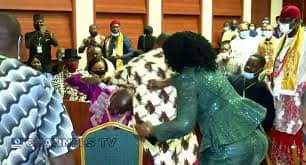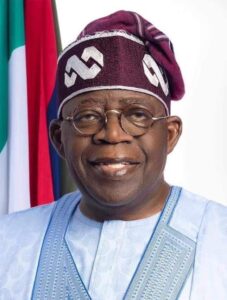
There was fracas on Thursday at the public hearing on the Petroleum Industry Bill (PIB) organised by the House of Representatives when an official of one of the host communities scheduled to make their presentation attacked one of the traditional rulers.
Although it was not immediately clear what led to the fight, trouble started immediately chairman of the House of Representative Ad hoc Committee on the PIB, Mohammed Tahir Mongunu called the HostCom, one of the host communities to make their presentation.
Mongunu had earlier announced one person will be selected from each host community to make presentation but was not apparently understood by those present who chorused no, no, no.
However, immediately Hostcom was called to make their submission, fracas erupted in the hall as one of the representatives later identified as High Chief Benjamin Tamaranebi pounced on one of the traditional rulers whose identity could not be ascertained a at the time of this report.
There were however different versions of what led to the fighting as some claimed some of the leaders of the host communities were induced by the oil companies to come and defend their position.
Some others claimed the host communities wanted to vent their anger on those they believe have been collecting money from the oil companies to scuttle their common interest.
Some other groups among the host communities described the traditional ruler, who was beaten as an impostor.
But he however refused to speak on what caused the fight.
amaranebi, who started the fight, said it was over an agreement for host communities to be getting 10 percent of equity in the operations of oil in the area.
While refusing to shed more light on why he attacked one of the monarchs in the area, he said: “I think it is not necessary for me to talk about whether we fought or not. You know all about the Niger Delta region. There is not King. All are comrades.
“You know about us. When Niger Deltans gather together, everything is bound to happen. All we are agitating for is 10% equity. The fight is because of 10% equity. The fight is because of 10% equity.
“We all agreed in terms of 10% equity. So, we are not fighting because of any other thing. All the fight you saw there was in agreement with 10% equity”.
He added: “We vehemently go against 2.5% operating cost. That is a trick. So, we want to be part and parcel of it. Let us be shareholders in the industry.
“That will guarantee security in our local communities that are producing oil and gas.
“If they give us 10% shareholding, that equity will guarantee that no one will spill any oil or vandalize any pipeline. But whatever thing that gets missing, communities will be missing as well.
“I want to agree on the 10% equity shareholding for the host Communities. That will guarantee security in the region as well as oil and gas industry in Nigeria.
But one of the traditional rulers, who spoke for his community in Delta at the Public hearing, Chief Monday Whiskey, described the fracas as the hand of Esau and the voice of Jacob, adding that it was obvious that those who started the fight were out to scuttle the ambition of the region.
He said: “I would not want to make a comment on that because that has always been what we have in the Niger Delta.
“When we are to make presentations that will better the lot of our people, some undesirable elements will be sponsored to go against the will of the people.
“What you saw is the hand of Esau and the voice of Jacob. From the aggressiveness he displayed there, you will know that he intentionally did what he did.
“A man was seated and you went to fight him. As a traditional ruler, I will not want to make a comment on that”.
An official of one of the CSOs known as We the People, Ken Henshaw accused the committee of being responsible for the fracas, pointing out if they were allowed to make their presentation, the fighting that ensured would not have happened.
However, all the host communities were however called upon individually to adopt their written presentation, rather than highlight the silent points contained therein.
By Tony Akowe and Nicholas Kalu














